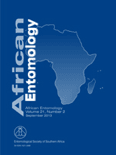
AFRICAN ENTOMOLOGY
Scope & Guideline
Pioneering Research in Agricultural and Ecological Entomology
Introduction
Aims and Scopes
- Biodiversity and Taxonomy of Insects:
Research on the diversity and classification of insect species across various African regions, contributing to the understanding of local ecosystems and informing conservation efforts. - Biological Control and Pest Management:
Studies focusing on the use of biological agents for pest control, including the assessment of natural enemies and the effectiveness of various biocontrol strategies in agricultural settings. - Ecological Interactions and Roles:
Investigations into the ecological roles of insects, including their interactions with plants, other animals, and their environment, highlighting their importance in ecosystems. - Insect Physiology and Behavior:
Research exploring the physiological and behavioral aspects of insects, contributing to the understanding of their adaptations and responses to environmental changes. - Applied Entomology in Agriculture:
Studies addressing practical applications of entomology in agriculture, including pest management strategies, crop protection, and the impact of agricultural practices on insect populations.
Trending and Emerging
- Molecular Techniques in Entomology:
An increasing use of molecular techniques, such as DNA barcoding and genetic analyses, to study insect diversity, pest identification, and population dynamics, indicating a trend towards more precise and scientifically rigorous methods. - Sustainable Agricultural Practices:
Research focusing on sustainable practices that integrate biological control, organic farming, and agroecology is gaining traction, addressing the need for environmentally friendly pest management solutions. - Climate Change Impact on Insects:
Emerging studies exploring the effects of climate change on insect populations, behaviors, and distributions, reflecting a growing awareness of the broader environmental challenges facing entomology. - Insect-Microbe Interactions:
Increased research into the interactions between insects and their microbial symbionts, particularly in relation to health, nutrition, and pest management, highlighting the complexity of these relationships. - Urban Entomology:
A rising interest in urban entomology, addressing insect issues in urban environments, including pest management and biodiversity in cities, reflecting changes in human-insect interactions.
Declining or Waning
- Chemical Pesticide Research:
There is a noticeable decline in research focused solely on chemical pesticides, as the emphasis shifts towards more sustainable and environmentally friendly pest management practices. - Traditional Insect Control Methods:
Research on traditional or less scientifically validated methods of insect control seems to be decreasing, reflecting a move towards evidence-based and integrated pest management approaches. - General Insect Ecology:
While ecological studies remain important, there is a trend away from broad, general studies of insect ecology without specific applications or implications for pest management or conservation. - Invasive Species Surveys:
The frequency of general surveys of invasive insect species without specific management strategies or ecological implications appears to be waning, as more targeted research is prioritized.
Similar Journals
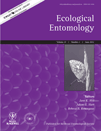
ECOLOGICAL ENTOMOLOGY
Advancing Knowledge at the Insect-Environment NexusECOLOGICAL ENTOMOLOGY is a leading peer-reviewed journal published by Wiley, focusing on the dynamic interplay between insects and their environments. With an ISSN of 0307-6946 and an E-ISSN of 1365-2311, this journal has been a pivotal resource in the fields of ecology and insect science since its inception in 1976, and is set to continue until 2024. Recognized for its high academic standards, the journal maintains a prestigious Q1 ranking in both the Ecology and Insect Science categories for 2023, and ranks in the 84th percentile among its peers in agricultural and biological sciences. Although not an Open Access journal, it provides vital insights into ecological processes and insect interactions, making it an essential read for researchers, professionals, and students committed to understanding and conserving biodiversity. The contributions published within its pages significantly advance the knowledge of ecological systems and inform practical approaches to environmental management.
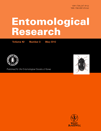
ENTOMOLOGICAL RESEARCH
Connecting Research to Real-World Insect ChallengesENTOMOLOGICAL RESEARCH, published by Wiley, is a prominent journal within the field of Insect Science, with a significant focus on advancing our understanding of entomological studies, including pest management, biodiversity, and ecological impacts of insects. Since its inception in 2007, the journal has served as a vital platform for researchers and practitioners to publish high-quality, peer-reviewed articles that contribute to the growing body of knowledge in this essential discipline. With an H-index illustrating its citation impact and its classification in the 2023 Scopus quartile rankings at Q3, ENTOMOLOGICAL RESEARCH ranks 69 out of 181 journals in its field, positioning itself within the 62nd percentile, which underscores its relevance and contribution to agricultural and biological sciences. Although it does not offer Open Access, the journal remains committed to ensuring that its content reaches the widest possible audience, supporting ongoing discoveries and innovations in insect science. For researchers, professionals, and students seeking to remain at the forefront of entomological advancements, ENTOMOLOGICAL RESEARCH is an indispensable resource.

APPLIED ENTOMOLOGY AND ZOOLOGY
Connecting science and sustainability in applied entomology.Applied Entomology and Zoology, published by Springer Japan KK, is a pivotal journal in the field of insect science, with an impressive track record since its inception in 1966. This esteemed publication, bearing ISSN 0003-6862 and E-ISSN 1347-605X, contributes significantly to the understanding of applied entomology, emphasizing research that supports sustainable agricultural practices and the ecological conservation of insects. Ranked in the Q2 category (2023) for Insect Science with a Scopus rank of #65 out of 181, it is recognized for its rigorous peer-review process and high-quality contributions that push the boundaries of our knowledge. Although it does not currently offer open access, the journal remains an essential resource for researchers, professionals, and students eager to advance their understanding of the complex interactions between insects and their environment. With a focus on practical applications, it aims to bridge the gap between entomological research and real-world implications, fostering innovation and promoting informed decision-making within the scientific community.
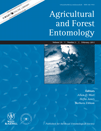
AGRICULTURAL AND FOREST ENTOMOLOGY
Advancing knowledge at the intersection of agriculture and entomology.AGRICULTURAL AND FOREST ENTOMOLOGY is a leading journal published by Wiley, focusing on the interface of entomology, agriculture, and forestry. With a robust impact reflected in its Q2 and Q1 quartile rankings in prominent categories like Agronomy and Crop Science, Forestry, and Insect Science, this journal serves as a vital platform for researchers and professionals seeking to advance their understanding of insect impacts on agricultural and forest ecosystems. Since its inception in 1999, it has provided a comprehensive collection of high-quality research, facilitating interdisciplinary discussions and innovations in pest management, biodiversity, and sustainable practices. Although it does not currently offer Open Access, the journal continues to uphold rigorous peer-review standards, ensuring that published works maintain a profound scientific value. As of 2023, its Scopus rankings further signify its prominence in the field, engaging a global audience keen on addressing the pressing challenges faced within agricultural and forest sciences.
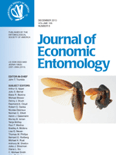
JOURNAL OF ECONOMIC ENTOMOLOGY
Fostering Interdisciplinary Dialogue on Insect ImpactJOURNAL OF ECONOMIC ENTOMOLOGY, published by OXFORD UNIV PRESS INC, stands as a premier interdisciplinary platform for researchers and professionals in the realms of entomology and ecological sciences. With a robust publication history dating back to 1945, this esteemed journal has consistently maintained its reputation for disseminating high-quality research, as evidenced by its prestigious Q1 rankings in both Ecology and Insect Science for 2023. The journal’s impact is highlighted by its excellent Scopus ranks, placing it in the top percentile of Agricultural and Biological Sciences and Environmental Science categories. Aimed at advancing the understanding of insects and their relationships with humans and ecosystems, the JOURNAL OF ECONOMIC ENTOMOLOGY offers a critical forum for original research articles, reviews, and opinion pieces that influence practices in pest management, conservation, and agricultural productivity. Although not an Open Access journal, its findings are pivotal for students, researchers, and professionals striving to address contemporary challenges in entomology and beyond.
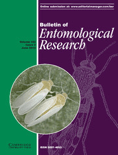
BULLETIN OF ENTOMOLOGICAL RESEARCH
Connecting Agriculture and Insect Science for Global ImpactBULLETIN OF ENTOMOLOGICAL RESEARCH, published by Cambridge University Press, is a prestigious journal that has been at the forefront of entomological research since its inception in 1910. With an impressive track record extending through to 2024, this journal serves as a vital platform for advancing knowledge in various related fields, notably Agronomy and Crop Science and Insect Science, where it ranks in the top quartile (Q2) and maintains a commendable position within the Scopus rankings in its categories. Notably, its contributions also intersect with Medicine in a broader scope, fostering interdisciplinary insights. While access to the journal content is not classified as 'Open Access,' its rigorous peer-reviewed articles are crucial for researchers, professionals, and students seeking to enhance their understanding of entomology and its applications in agronomy and beyond. The journal's impact is reflected in its notable percentile rankings, emphasizing its relevance and influence in the academic community. Located at the heart of the UK, the BULLETIN OF ENTOMOLOGICAL RESEARCH continues to be an essential resource for those dedicated to the study and understanding of insects and their impacts on agriculture and health.
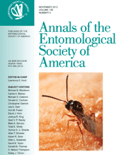
ANNALS OF THE ENTOMOLOGICAL SOCIETY OF AMERICA
Innovating Insights into the World of InsectsANNALS OF THE ENTOMOLOGICAL SOCIETY OF AMERICA is a premier journal dedicated to advancing the field of insect science, published by Oxford University Press. With an impressive impact factor and classified in the Q1 quartile for its category, this journal ranks among the top publications in agricultural and biological sciences, specifically within insect science, positioned at #28 out of 181, indicating its significant influence and high-quality research contributions. The journal aims to disseminate original research, comprehensive reviews, and groundbreaking findings that enhance our understanding of entomology, spanning across ecological, evolutionary, and applied segments. With a consistent publication history since 1938, researchers, professionals, and students will benefit from the wealth of knowledge presented in its pages. Although the journal does not currently offer open access, it remains a vital resource for those seeking to stay at the forefront of entomological research and innovation.
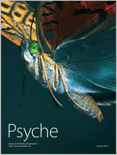
Psyche-A Journal of Entomology
Advancing Knowledge in Entomological SciencePsyche-A Journal of Entomology is a distinguished open-access journal published by Hindawi Ltd, specializing in the field of entomology, including aspects of ecology, evolution, behavior, and systematics of insects. Established in 1874, this journal has a rich history of contributing to the scientific community by disseminating high-quality research related to insects and their diverse interactions within ecosystems. With an impact factor placing it in Q3 for both Ecology, Evolution, Behavior and Systematics and Insect Science, Psyche serves as a pivotal platform for researchers, professionals, and students aiming to deepen their understanding of insect-related science. The journal's commitment to open access ensures that research is accessible to a global audience, promoting collaboration and innovation in entomological studies. Covering a broad timeline of converged years from 1874 to 2024, Psyche fosters a comprehensive dialogue around insect biodiversity, conservation, and the ever-evolving dynamics of ecosystems in which insects play crucial roles.

Frontiers in Insect Science
Advancing the Insect Science FrontierFrontiers in Insect Science is a pioneering open-access journal dedicated to the advancement of knowledge in the field of insect science. Published by FRONTIERS MEDIA SA in Switzerland, this journal serves as a vital platform for researchers, professionals, and students to disseminate high-quality, peer-reviewed research spanning diverse topics within insect biology, ecology, and pest management. Since its establishment in 2021, the journal has gained recognition, ranking in the Q2 category of Insect Science with a Scopus ranking of #92 out of 181 in the field. With a commitment to promoting open access and collaboration, Frontiers in Insect Science is instrumental in fostering innovative research and practical applications essential for combating biodiversity loss and enhancing agricultural sustainability. As a freely accessible resource, it invites contributions that impact both fundamental and applied insect research, connecting a global network of scholars eager to explore the fascinating world of insects.
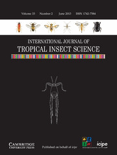
INTERNATIONAL JOURNAL OF TROPICAL INSECT SCIENCE
Elevating Knowledge in Insect Science and BeyondINTERNATIONAL JOURNAL OF TROPICAL INSECT SCIENCE, published by Springer International Publishing AG, is a leading interdisciplinary journal dedicated to advancing knowledge in the fields of insect science and ecology. With its ISSN 1742-7584 and E-ISSN 1742-7592, this journal provides a platform for researchers to publish high-quality, peer-reviewed articles that explore various aspects of tropical insect biology, behavior, and their ecological impacts. As evidenced by its Q3 ranking in both Ecology, Evolution, Behavior and Systematics and Insect Science, it plays a vital role in fostering scientific dialogue and innovation within these disciplines. Researchers affiliated with the journal benefit from its visibility and growing impact, as demonstrated by its Scopus ranks, with a percentile standing of 61st in Insect Science. Although the journal is not open access, it still reaches a wide academic audience, making significant contributions to our understanding of tropical ecosystems. Situated in Switzerland, this journal is crucial for students, professionals, and researchers invested in the intersection of entomology and ecological science.